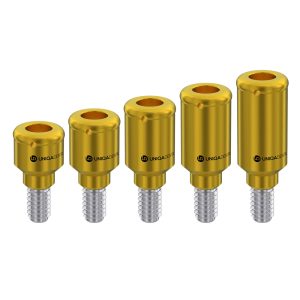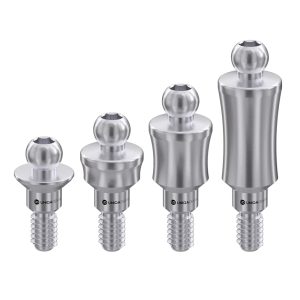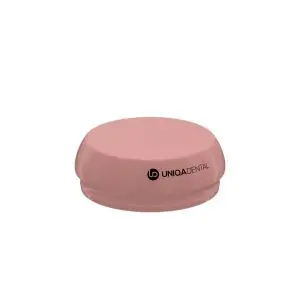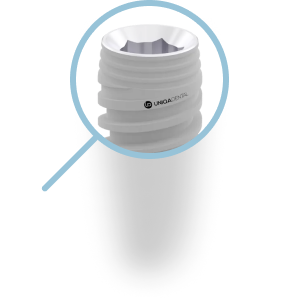Through this section of our website you can buy abutments for conditional removable dentures. Note that we are not talking about dentures that the patient removes and places on their own every day. Abutments are sold here for full root implants, but the top of the abutment is designed in such a way (ball or DLOC) that the denture can be removed without having to destroy the cement or drill out the dental shaft. In principle, the patient can remove and place removable dentures on their own, but often only the dentist does this during maintenance and preventive checkups. The popularity of this technique has been declining in recent years, but there are still many specialists and patients who prefer this type of denture. Removable dentures still have a number of advantages:
Types of removable dentures
All types of removable dentures can be divided according to the method of attachment. A removable denture can rest on:
- The mucosa of the mouth. These are lamellar dentures, which are actually suctioned and held in place by rarefaction and the help of a special cream that helps hold the denture in place more firmly. It is the easiest and most affordable way of dentures, which removable dentures replace all of the teeth on the same dental arch. But it has some limitations, such as the hardness of food, even apples can be a problem. Also, after tooth loss, the alveolar bone no longer receives the stress and stimulation that the roots of the teeth used to transmit. Without experiencing the stresses, the bone weakens and resorbs, which is bad in the long run.
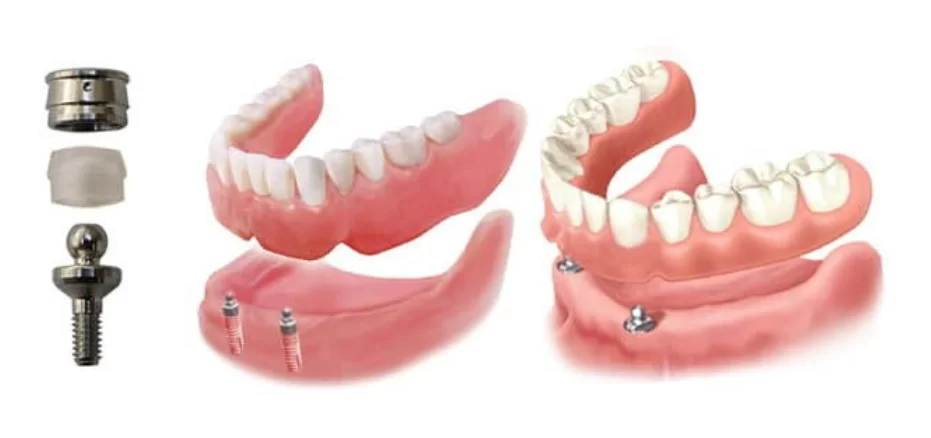
- The patient’s remaining teeth – this type of denture is called a partial denture, or a removable partial denture. It is often prefabricated with several elements, and the elements are connected by attachments and clasps supported by the patient’s remaining teeth. The quality of life of the patient is much higher with these reconstructions. The same applies to the load on the bone, which is transmitted by the preserved tooth roots.
- Root implants with a specific head shape. This is currently the best solution for removable dentures. A full-fledged root implant is implanted in the jaw. The dental prosthesis can be placed at the same time as the implantation, or it can be placed 6-8 weeks after the osseointegration process is complete. It depends on the condition of the patient’s bone, if we are dealing with bone type D1 or D2, we can do a one-stage restoration. Primary stability and torque above 35 Ncm is sufficient to keep the micromobility of the implant within 50-100 microns. The denture should be light enough to be placed on the same day as the implant. Often, a temporary bridge is placed for the first 3-4 months, and once osseointegration is complete, the temporary denture is removed and a permanent denture is placed. The quality of life of a patient with a temporary implant is as good as with a permanent implant, but due to the fact that it is made of plastic, the temporary implant will wear off much faster. And using a temporary reconstruction for more than 6 months is not recommended.
We offer two types of abutments for removable dentures: ball and cylindrical Locator abutments. Let’s discuss them in more detail.
Abutments with ball attachments
The interface of these removable denture abutments is compatible with most implants made in the USA, Europe, Israel and Korea. They are available with a standard 22° and 24° hex or taper. On the oral side, all abutments have a standard spherical interface. The attachment of the bridge to the ball abutment is carried out via a silicone cap and a cylindrical mating piece that is glued into the denture, see image below.

We offer silicone inserts of different stiffness and elasticity. The choice of the degree of elasticity depends on the location of the implant and the bite of the patient. The silicone insert allows to compensate and dissipate some of the axial load and lateral displacement of the removable denture relative to the ball abutment. Lateral loads are unavoidable during normal life, causing a pressure point on the removable denture. The silicone cap compensates for the pressure point for a period of time, but must then be replaced as it wears out.
Silicone inserts are a consumable item. If the patient comes in every six months for a check-up, during which the denture is removed, it is reinstalled with the new silicone caps.
DLOC abutments for removable dentures
They are also the Locator Removable Denture Attachment System (DLOC). Structurally similar to the previous version, but the interface to which the silicone cap is attached is cylindrical with a recess in the center, see illustration below.

Here, too, the elastic insert can compensate for lateral deviations as seen in the illustration below. The key difference between the Locator (DLOC) and the previous removable denture anchoring option is greater stability and load-bearing capacity.
But both systems are more popular in lower-middle income areas because they are inferior in practicality, reliability and durability to Multi-Unit screw-retained platforms.
Advantages and disadvantages of removable dentures
We will consider the types of removable dentures that most often compete in cases of complete edentulism.
Lamellar prostheses
Material for the manufacture of plastic or nylon. In order for such a prosthesis to hold well due to suction to soft tissues, it is necessary to manufacture them with high accuracy. It is important that the basis coincides with the contour of the jaw. It is easier to achieve good contact on the upper jaw, because there part of the structure goes to the palate and the contact area is significantly increased.
Let’s move on to the advantages:
- The main advantage of plastic products is the price of a removable denture.
- Easy to install and daily use.
- No traumatic implant surgery with a long rehabilitation period
But unfortunately, there are more disadvantages and they need to be conveyed to patients:
- The lamellar prosthesis is quite bulky, it takes a long time to get used to the foreign body in the mouth. Often you need to re-work out diction.
- The suction effect does not last long. Over time, the gum under the prosthesis settles. Then you have to apply fixing creams and gels. But they are also effective only for a while, which means you will need to order a new prosthesis. It is also important that the subsidence of the gums is a sign of the degradation of the alveolar ridge, it will not work to build it up without surgery. Thus, a “temporary solution” with a lamellar prosthesis may complicate the placement of dental implants in the future. Indeed, in six months or a year, the height and width of the bone ridge may become insufficient for implantation. And you will have to undergo bone grafting surgery.
- The sense of taste is also noticeably reduced due to the fact that a significant part of the palate is covered.
- Discomfort and difficulty in removing the prosthesis from the upper jaw. The vacuum effect is often too strong due to the large contact area.
- Problems and discomfort when chewing solid food. Even some fruits. The hard fragment deforms the lamellar denture, which causes a pressure point on the denture towards the gum. Also, the plate prosthesis can shift and fall out when chewing food with solid inclusions.
Spherical Attachments and Cylindrical Locator (DLOC)
These systems for removable dentures are placed on successfully engrafted root implants and are often used for all-on-four® or all-on-6® denture reconstruction. It is a more comfortable and progressive system with many advantages:
- Secure fixation of the prosthesis – no need to get used to or limit yourself in everyday life.
- You don’t have to limit yourself to eating solid foods. Unless, of course, we are talking about cracking nuts and other extreme stress. This kind of thing is not recommended for people with a full set of healthy teeth either.
- The denture is relatively easy to remove, which facilitates examinations, cleaning of the denture itself, and oral hygiene procedures.
- The removable denture distributes the load evenly through the root implants. There is a so-called “bone training” and no loss of bone density or volume.
But the system of removable dentures on supports also has disadvantages:
- The stability of the denture relative to the abutment is less than in the screw and cemented systems.
- The need for periodic replacement of the silicone inserts. Patients often miss deadlines and try to find and install the elastic cap themselves. This can cause the denture to wobble on the supports, which can traumatize the soft tissues and transmit unnecessary stress to the implant. This runs the risk of unscrewing or even breaking the screw that secures the abutment to the implant.
- The durability of this platform is inferior to the fixed options. The Multi-Unit screw-retained system is particularly advantageous. It has all the disadvantages of a removable denture and also has a number of advantages over cemented fixation. Key advantages of the Multi-Unit system over cemented fixation:
- all cementing and bonding operations take place outside the patient’s mouth, which means no irritation and inflammation from soft tissue contact with cement residues;
- screw-retained prosthesis can also be considered conditionally removable, you need to drill holes in front of the screw shafts and remove the construction for repair and maintenance, whereas a cemented prosthesis needs to be knocked down and a new one made;
- the accuracy of fabrication and fit with screw fixation is much higher, which means there are no internal overstresses and the pamp effect, when saliva with high bacterial content is pumped deep into the gingival cuff.
Therefore, removable dentures of all kinds can be attributed to outgoing technology or temporary solutions. Such decisions remain relevant only in countries with low economic indicators.
Why it is profitable to buy abutments for removable dentures at Uniqa Dental
We consider it more profitable to do business with our company because most of the investment is spent on equipment and quality control. We have minimal tolerances (tolerances) and high compatibility with dental implants of the major players in the market. This allows the price of removable dentures to be kept at a reasonable level with impeccable quality. The table below lists the brands with which our products are 100% compatible.
| Connection hexagon socket |
Connection cone 22° |
| Zimmer |
Hiossen /Osstem |
| MIS |
Nobel Biocare |
| Alpha Bio |
Magagen Any Ridge |
| Cortex |
Megagen Any One |
| Adin |
|
The material used to manufacture abutments and other parts for removable dentures is also noteworthy. We use Grade 23 titanium-aluminum-vanadium alloy, which is comparable in strength to Grade 23, but has considerably better formability (malleability). In addition, if you decide to buy components for removable dentures, you will get:
- High precision, as well as strength and resiliency at a much better level than most competitors. You pay only for quality, not for the circulation of beautiful brochures with loud promises.
- Free shipping of all components anywhere in the world.
- Fast delivery within the USA, because we have warehouses and representative offices in the USA.
In addition, you can order samples for testing from us, leave a request and we will send an introductory kit on special terms.

